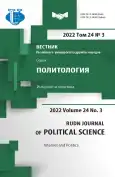Восприятие российскими пользователями социальных медиа массовых протестов при попытке государственного переворота в Казахстане
- Авторы: Бродовская Е.В.1, Парма Р.В.1, Подрезов К.А.2, Давыдова М.А.1
-
Учреждения:
- Финансовый университет при Правительстве РФ
- Тульский государственный педагогический университет им. Л.Н. Толстого
- Выпуск: Том 24, № 3 (2022): Интернет и политика
- Страницы: 545-561
- Раздел: ПОЛИТИЧЕСКАЯ ПОЛЯРИЗАЦИЯ И ИНТЕРНЕТ-ПРОТЕСТ
- URL: https://journal-vniispk.ru/2313-1438/article/view/322618
- DOI: https://doi.org/10.22363/2313-1438-2022-24-3-545-561
- ID: 322618
Цитировать
Полный текст
Аннотация
Контекст исследования обусловлен существенным пересечением российских и казахстанских сегментов социальных медиа и взаимным влиянием политических процессов. В условиях политической мобилизации массовых протестов в Казахстане, переросших в попытку государственного переворота, активизировалась деятельность российских контрэлит в различных субъектах Российской Федерации. Применение гибридной стратегии исследования в сочетании когнитивного картирования и социально-медийного анализа позволило выявить динамические, структурные и содержательные характеристики репрезентации событий в Казахстане в российских социальных медиа. По результатам исследования авторами сделан вывод о том, что масштабность протестов в Казахстане позволила привлечь кратковременный интерес российской аудитории преимущественно в приграничных регионах. Использование экономических триггеров (рост цен, неэффективная социальная политика и др.) обусловило вовлечение взрослой аудитории в обсуждение казахстанских событий, существенная часть младшей и старшей молодежи была выключена из информационных потоков, посвященных событиям в Казахстане. В ходе исследования была выявлена попытка российских оппозиционных акторов через применение манипулятивной технологии «заражения» экстраполировать политико-экономическое недовольство в Казахстане на ситуацию в Российской Федерации. При этом наибольший резонанс в российском сегменте пользователей был вызван непосредственно включением Организации Договора о коллективной безопасности (ОДКБ) в процесс урегулирования внутриполитического конфликта.
Об авторах
Елена Викторовна Бродовская
Финансовый университет при Правительстве РФ
Email: brodovskaya@inbox.ru
ORCID iD: 0000-0001-5549-8107
доктор политических наук, главный научный сотрудник Центра политических исследований
Москва, Российская ФедерацияРоман Васильевич Парма
Финансовый университет при Правительстве РФ
Email: rvparma@mail.ru
ORCID iD: 0000-0002-3413-4264
кандидат политических наук, доцент Департамента политологии факультета социальных наук и массовых коммуникаций
Москва, Российская ФедерацияКонстантин Андреевич Подрезов
Тульский государственный педагогический университет им. Л.Н. Толстого
Email: podrezov@tsput.ru
ORCID iD: 0000-0003-1309-1784
кандидат политических наук, ректор
Тула, Российская ФедерацияМария Александровна Давыдова
Финансовый университет при Правительстве РФ
Автор, ответственный за переписку.
Email: marchikdavydova@mail.ru
ORCID iD: 0000-0003-3377-7679
лаборант-исследователь Центра политических исследований
Москва, Российская ФедерацияСписок литературы
- Akhremenko, A.S., Stukal, D.K., & Petrov, A.P. (2020). Network or text? Factors of protest dissemination in social media: theory and data analysis. Polis. Political studies, 2, 73–91. (In Russian).
- Andres, M.-H. (2017). Social Media, Civic Engagement, and Slacktivism. Colombia Journal of International Affairs, 230–246.
- Boulliane, S. (2017). Revolution in the making? Social media effects across the globe Inf. Information Communication and Society, 22, 1–16.
- Brodovskaya, E.V., Davydova, M.A., & Eremin, E.A. (2021). Prolonged political protests in Russia and in the Republic of Belarus in summer-autumn 2020: the reference of the Russian audience of social media. Humanities. Bulletin of the Financial University, 1, 6–13. (In Russian).
- Brodovskaya, E.V., & Dombrovskaya, A.Yu. (2018) Big data in political research. Moscow: Moscow Pedagogical State University. (In Russian).
- Castells, M. (2015). Networks of Outrage and Hope: Social Movements in the Internet Age. Cambridge: Polity.
- Dalton, R.J. (1984) Cognitive Mobilization and Partisan Dealignment in Advanced Industrial Democracies. The Journal of Politics, (1), 264–284.
- Dijk Van, T. (2013). Discourse and Power: Representation of Dominance in Language and Communication. Moscow: Librocom. (In Russian). [Dijk, T.A. (2008). Discourse and Power. New York: Palgrave Macmillan]
- Fairclough, N. (1995). Critical discourse analysis. London: Longman.
- Harre, R. (1986) An outline of the social constructionist viewpoint. In D. Scruton & R. Harré, The social construction of emotions. 1986. P. 2–14. http://doi.org/10.2307/3341379
- Howard, P.N. (2010) The Digital Origins of Dictatorship and Democracy: Information Technology and Political Islam. London: Oxford University Press.
- Kahne, J., & Bowyer, B. (2018). The Political Significance of Social Media Activity and Social Networks. Political Communication, 35, 1–24.
- Laclau, E., & Mouffe, Ch. (2001). Hegemony and Socialist Strategy. Towards Radical Democratic Politics. London, New York: Verso. Second Edition.
- Lukushin, V.A., & Davydova, M.A. The practice of using TikTok as a tool of political mobilization. Internet and Modern Society: Proceedings of the XXIV International Joint Scientific Conference. ITMO University, 2021. (In Russian).
- Sloam, J. (2016). Diversity and voice: The political participation of young people in the European Union. The British Journal of Politics and International Relations,18, 521–537.
- Theocharis, Y. (2015). The Conceptualization of Digitally Networked Participation. Social Media + Society, (2), 75–92.
Дополнительные файлы









